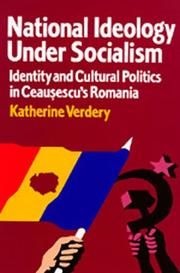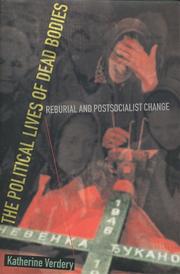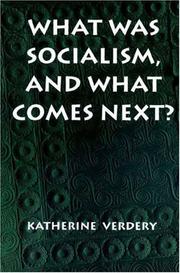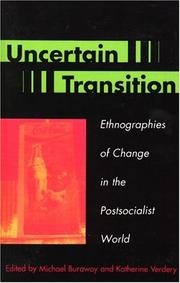| Listing 1 - 10 of 16 | << page >> |
Sort by
|

ISBN: 0801441978 0801488699 Year: 2003 Volume: *1 Publisher: Ithaca, N.Y. Cornell University Press
Abstract | Keywords | Export | Availability | Bookmark
 Loading...
Loading...Choose an application
- Reference Manager
- EndNote
- RefWorks (Direct export to RefWorks)
Land. Real estate --- Social stratification --- Economic policy and planning (general) --- Romania --- Land reform --- Peasants --- Post-communism --- Social change --- Réforme agraire --- Paysannerie --- Postcommunisme --- Changement social --- Transylvania (Romania) --- Transylvanie (Roumanie) --- Rural conditions. --- Conditions rurales --- Social Sciences and Humanities. History --- Rural History --- Europe --- Central Europe --- Central Europe. --- Réforme agraire --- Peasantry --- Rural conditions --- Sociale stratificatie --- Grond. Onroerend goed --- Economische politiek en planning (algemeen) --- Roemenië

ISBN: 0520072162 0520203585 Year: 1991 Volume: 7 Publisher: Berkeley : University of California Press,
Abstract | Keywords | Export | Availability | Bookmark
 Loading...
Loading...Choose an application
- Reference Manager
- EndNote
- RefWorks (Direct export to RefWorks)
The current transformation of many Eastern European societies is impossible to understand without comprehending the intellectual struggles surrounding nationalism in the region. Anthropologist Katherine Verdery shows how the example of Romania suggests that current ethnic tensions come not from a resurrection of pre-Communist Nationalism but from the strengthening of national ideologies under Communist Party rule.
Intellectuals --- Intellektuella --- Ceausescu, Nicolae, --- Romania --- Cultural policy. --- Politics and government --- Intellectuels --- Ceaușescu, Nicolae --- Roumanie --- Cultural policy --- Politique culturelle --- Politique et gouvernement

ISBN: 9780231112314 0231112319 0231112300 Year: 1999 Publisher: New York (N.Y.) : Columbia university press,
Abstract | Keywords | Export | Availability | Bookmark
 Loading...
Loading...Choose an application
- Reference Manager
- EndNote
- RefWorks (Direct export to RefWorks)
Dead --- Human body --- Funeral rites and ceremonies --- Ancestor worship --- Morts --- Corps humain --- Funérailles --- Political aspects --- Symbolic aspects --- Russia (Federation) --- Aspect politique --- Aspect symbolique --- Rites et cérémonies --- Culte --- Europe, Eastern --- Europe de l'Est --- Russie --- Politics and government. --- Politique et gouvernement --- #SBIB:324H30 --- #SBIB:328H27 --- #SBIB:39A10 --- Body, Human --- Human beings --- Body image --- Human anatomy --- Human physiology --- Mind and body --- Funerals --- Mortuary ceremonies --- Obsequies --- Manners and customs --- Rites and ceremonies --- Burial --- Cremation --- Cryomation --- Mourning customs --- Cadavers --- Corpses --- Deceased --- Human remains --- Remains, Human --- Death --- Corpse removals --- Death notices --- Embalming --- Obituaries --- Ancestor cult --- Dead, Worship of the --- Worship, Ancestor --- Cults --- Ancestral shrines --- Politieke cultuur --- Instellingen en beleid: Midden- en Centraal Europa: algemeen --- Antropologie: religie, riten, magie, hekserij --- Religious aspects

ISBN: 0691011338 069101132X 1400813727 9786612753039 1282753037 1400821991 9781400813728 9781400821990 9780691011332 9780691011325 1400808235 Year: 1996 Publisher: Princeton, N.J. Princeton University Press
Abstract | Keywords | Export | Availability | Bookmark
 Loading...
Loading...Choose an application
- Reference Manager
- EndNote
- RefWorks (Direct export to RefWorks)
Among the first anthropologists to work in Eastern Europe, Katherine Verdery had built up a significant base of ethnographic and historical expertise when the major political transformations in the region began to take place. In this collection of essays dealing with the aftermath of Soviet-style socialism and the different forms that may replace it, she explores the nature of socialism in order to understand more fully its consequences. By analyzing her primary data from Romania and Transylvania and synthesizing information from other sources, Verdery lends a distinctive anthropological perspective to a variety of themes common to political and economic studies on the end of socialism: themes such as "civil society," the creation of market economies, privatization, national and ethnic conflict, and changing gender relations. Under Verdery's examination, privatization and civil society appear not only as social processes, for example, but as symbols in political rhetoric. The classic pyramid scheme is not just a means of enrichment but a site for reconceptualizing the meaning of money and an unusual form of post-Marxist millenarianism. Land being redistributed as private property stretches and shrinks, as in the imaginings of the farmers struggling to tame it. Infused by this kind of ethnographic sensibility, the essays reject the assumption of a transition to capitalism in favor of investigating local processes in their own terms.
Communism --- Post-communism --- Post-communism. --- Socialism --- Postcommunism --- World politics --- Political philosophy. Social philosophy --- Eastern and Central Europe --- Politieke filosofie. Sociale filosofie --- Oost- en Centraal-Europa --- #SBIB:321H60 --- #SBIB:328H27 --- Westerse politieke en sociale theorieën vanaf de 19e eeuw: socialisme, marxisme, communisme, anarchisme --- Instellingen en beleid: Midden- en Centraal Europa: algemeen

ISBN: 0520917286 0585128804 9780520917286 9780585128801 0520072162 0520203585 Year: 1995 Publisher: Berkeley, Calif. University of California Press
Abstract | Keywords | Export | Availability | Bookmark
 Loading...
Loading...Choose an application
- Reference Manager
- EndNote
- RefWorks (Direct export to RefWorks)
The current transformation of many Eastern European societies is impossible to understand without comprehending the intellectual struggles surrounding nationalism in the region. Anthropologist Katherine Verdery shows how the example of Romania suggests that current ethnic tensions come not from a resurrection of pre-Communist Nationalism but from the strengthening of national ideologies under Communist Party rule.
Intellectuals --- Regions & Countries - Europe --- History & Archaeology --- Balkan Peninsula --- Intelligentsia --- Persons --- Social classes --- Specialists --- Ceaușescu, Nicolae. --- Tsʹeʼoshesḳo, Niḳoleye --- Tseaouseskou, Nikolae --- Tshāwshīskū, Nīqūlāy --- Chʻi-ao-sai-ssu-kʻu --- Chaushesku, Nikolae --- Chaushesuku, Nikorae --- Ceaușescu, Niculae --- צ׳אושסקו, ניקולאי --- Romania --- Government of Romania --- Lo-ma-ni-ya --- Luomaniya --- R.N.R. --- R.P.R. --- R.P. Romînă --- R.S.R. --- Republica Populară Romînă --- Republica Socialistă România --- Rhowmenia --- RNR --- Román Szocialista Köztársaság --- Romāniyā --- Romanyah --- Roumania --- Roumanie --- RP Romînă --- RPR --- RSR --- Rumania --- Rumänien --- Rumenyah --- Rumenye --- Rumunia --- Rumŭnii︠a︡ --- Rumunsko --- Rumynii︠a︡ --- Rumynskai︠a︡ Narodnai︠a︡ Respublika --- Румыния --- ルーマニア --- 羅馬尼亞 --- 루마니아 --- Moldavia --- Wallachia --- Cultural policy. --- Politics and government --- Intellectual life --- 20th century eastern european history. --- 20th century eastern european politics. --- anthropology. --- communism. --- communist party rule. --- cultural production. --- cultural studies. --- dogmatism. --- eastern european history. --- eastern european society. --- elitism. --- ethnic tensions. --- marxism. --- national ideology. --- nationalism. --- political history. --- pre communist nationalism. --- presocialist romania. --- real socialism. --- reassertion. --- romania. --- romanian history. --- socialism. --- society and culture in east central europe series. --- state formation. --- suppression. --- universality. --- Royaume de Roumanie

ISBN: 1501717251 9781501717253 0801441978 9780801441974 0801488699 9780801488696 0810441978 0810488699 9780810441972 0810441977 9780810488694 0810488698 Year: 2018 Publisher: Ithaca, NY
Abstract | Keywords | Export | Availability | Bookmark
 Loading...
Loading...Choose an application
- Reference Manager
- EndNote
- RefWorks (Direct export to RefWorks)
In most countries in Eastern Europe and the former Soviet Union, the fall of communism opened up the possibility for individuals to acquire land. Based on Katherine Verdery's extensive fieldwork between 1990 and 2001, The Vanishing Hectare explores the importance of land and land ownership to the people of one Transylvanian community, Aurel Vlaicu. Verdery traces how collectivized land was transformed into private property, how land was valued, what the new owners were able to do with it, and what it signified to each of the different groups vying for land rights. Verdery tells this story about transforming socialist property forms in a global context, showing the fruitfulness of conceptualizing property as a political symbol, as a complex of social relations among people and things, and as a process of assigning value. This book is a window on rural life after socialism but it also provides a framework for assessing the neo-liberal economic policies that have prevailed elsewhere, such as in Latin America. Verdery shows how the trajectory of property after socialism was deeply conditioned by the forms property took in socialism itself; this is in contrast to the image of a "tabula rasa" that governed much thinking about post-socialist property reform.
Social change --- Post-communism --- Peasants --- Land reform --- Change, Social --- Cultural change --- Cultural transformation --- Societal change --- Socio-cultural change --- Social history --- Social evolution --- Postcommunism --- World politics --- Communism --- Peasantry --- Agricultural laborers --- Rural population --- Marks (Medieval land tenure) --- Villeinage --- Agrarian reform --- Economic policy --- Land use, Rural --- Social policy --- Agriculture and state --- Transylvania (Romania) --- Ardeal (Romania) --- Erdély (Romania) --- Siebenbürgen (Romania) --- Transilvania (Romania) --- Rural conditions.
Book
ISBN: 9789633860519 9633860512 9786155225994 6155225990 9633860490 9789633860496 Year: 2022 Publisher: Budapest New York
Abstract | Keywords | Export | Availability | Bookmark
 Loading...
Loading...Choose an application
- Reference Manager
- EndNote
- RefWorks (Direct export to RefWorks)
Nothing in Soviet-style communism was as shrouded in mystery as its secret police. Its paid employees were known to few and their actual numbers remain uncertain. Its informers and collaborators operated clandestinely under pseudonyms and met their officers in secret locations. Its files were inaccessible, even to most party members. The people the secret police recruited or interrogated were threatened so effectively that some never told even their spouses, and many have held their tongues to this day, long after the regimes fell.With the end of communism, many of the newly established governments--among them Romania's--opened their secret police archives. From those files, as well as her personal memories, the author has carried out historical ethnography of the Romanian Securitate. Secrets and Truths is not only of historical interest but has implications for understanding the rapidly developing "security state" of the neoliberal present.
Political persecution --- Secret service --- Political repression --- Repression, Political --- Persecution --- Civil rights --- Secret police (Secret service) --- Police --- Detectives --- Intelligence service --- Spies --- History. --- Romania. --- DSS (Romania) --- History --- E-books --- 20th century, Ethnography, History, Political persecution, Romania, Secret service.
Book
ISBN: 0822370662 9780822370666 9780822370819 0822370816 Year: 2018 Publisher: Durham : Duke University Press,
Abstract | Keywords | Export | Availability | Bookmark
 Loading...
Loading...Choose an application
- Reference Manager
- EndNote
- RefWorks (Direct export to RefWorks)
Cold War --- Secret service --- Verdery, Katherine, - 1948 --- -Romania --- History --- Verdery, Katherine, --- Romania. --- Romania --- Politics and government
Book
ISBN: 1283163861 9786613163868 1400840430 9781400840434 0691149739 0691149720 9780691149738 9780691149721 6613163864 Year: 2011 Publisher: Princeton, NJ
Abstract | Keywords | Export | Availability | Bookmark
 Loading...
Loading...Choose an application
- Reference Manager
- EndNote
- RefWorks (Direct export to RefWorks)
In 1949, Romania's fledgling communist regime unleashed a radical and brutal campaign to collectivize agriculture in this largely agrarian country, following the Soviet model. Peasants under Siege provides the first comprehensive look at the far-reaching social engineering process that ensued. Gail Kligman and Katherine Verdery examine how collectivization assaulted the very foundations of rural life, transforming village communities that were organized around kinship and status hierarchies into segments of large bureaucratic organizations, forged by the language of "class warfare" yet saturated with vindictive personal struggles. Collectivization not only overturned property relations, the authors argue, but was crucial in creating the Party-state that emerged, its mechanisms of rule, and the "new persons" that were its subjects. The book explores how ill-prepared cadres, themselves unconvinced of collectivization's promises, implemented technologies and pedagogies imported from the Soviet Union through actions that contributed to the excessive use of force, which Party leaders were often unable to control. In addition, the authors show how local responses to the Party's initiatives compelled the regime to modify its plans and negotiate outcomes. Drawing on archival documents, oral histories, and ethnographic data, Peasants under Siege sheds new light on collectivization in the Soviet era and on the complex tensions underlying and constraining political authority.
Collectivization of agriculture --- Agriculture and state --- Agrarian question --- Agricultural policy --- Agriculture --- State and agriculture --- Agricultural collectivization --- Collective farming --- Collectivisation of agriculture --- History --- Government policy --- Romania --- Politics and government --- Economic policy --- Land reform --- Land, Nationalization of --- Collective farms --- E-books --- Collectivisation de l'agriculture --- Politique agricole --- Histoire --- Roumanie --- Politique et gouvernement --- Communism. --- Communist Party. --- Eastern Europe. --- MarxistЌeninist principles. --- Party cadres. --- Party-state. --- Romania. --- Romanian villagers. --- Securitate cadres. --- Soviet Union. --- Soviet blueprint. --- agrarian population. --- agricultural collectivization. --- associations. --- bureaucratic apparatus. --- bureaucratization. --- categories. --- chiaburs. --- class equality. --- class stratification. --- class war. --- class warfare. --- collective farms. --- collectives. --- collectivization. --- colonization. --- communist regime. --- consent. --- denunciation. --- ecological adaptation. --- economic adaptation. --- ethnic composition. --- ethnonational groups. --- gender roles. --- generational expectations. --- industrial development. --- industrial facilities. --- interwar fascist movement. --- kinship. --- land ownership. --- land reform. --- local politics. --- modern state-making. --- new social order. --- new socialist person. --- personalistic ties. --- personhood. --- persuasion work. --- petition writing. --- political authority. --- political insurgents. --- propaganda. --- religion. --- religious composition. --- replica regimes. --- rural life. --- sabotage. --- social conflict. --- social engineering. --- social mobility. --- social organization. --- social practices. --- social relations. --- social status. --- socialist body politic. --- status inequality. --- uprisings. --- village life. --- village social organization. --- village status systems.

ISBN: 0847690431 0847690423 Year: 1999 Publisher: Lanham Rowman & Littlefield
Abstract | Keywords | Export | Availability | Bookmark
 Loading...
Loading...Choose an application
- Reference Manager
- EndNote
- RefWorks (Direct export to RefWorks)
Post-communism --- Social change --- #SBIB:328H27 --- #SBIB:39A72 --- 316.42 --- 316.42 Social change. Sociale ontwikkeling. Sociale veranderingen. Modernisering. Evolutie .Sociale revolutie. Modernisme --- Social change. Sociale ontwikkeling. Sociale veranderingen. Modernisering. Evolutie .Sociale revolutie. Modernisme --- Instellingen en beleid: Midden- en Centraal Europa: algemeen --- Etnografie: Europa --- Europe, Eastern --- Russia (Federation) --- East Europe --- Eastern Europe --- Russian Federation --- Rossiyskaya Federatsiya --- Rossiya (Federation) --- Rossii︠a︡ (Federation) --- Российская Федерация --- Rossiĭskai︠a︡ Federat︠s︡ii︠a︡ --- Російська Федерація --- Rosiĭsʹka Federat︠s︡ii︠a︡ --- Federazione della Russia --- Russische Föderation --- RF --- Federation of Russia --- Urysye Federat︠s︡ie --- Правительство России --- Pravitelʹstvo Rossii --- Правительство Российской Федерации --- Pravitelʹstvo Rossiĭskoĭ Federat︠s︡ii --- Правительство РФ --- Pravitelʹstvo RF --- Rosja (Federation) --- O-lo-ssu (Federation) --- Roshia Renpō --- Federazione russa --- OKhU --- Orosyn Kholboony Uls --- Russian S.F.S.R. --- Social conditions --- Eluosi (Federation) --- 俄罗斯 (Federation) --- RF (Russian Federation) --- Россия (Federation)
| Listing 1 - 10 of 16 | << page >> |
Sort by
|

 Search
Search Feedback
Feedback About UniCat
About UniCat  Help
Help News
News